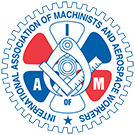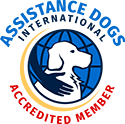Service dogs are working, and very important to their handler; any distraction can inhibit the dog’s ability to perform its job.
Please do not distract the dog in any way, including:
-
No petting without permission
-
No talking
-
Do not say the dog’s name
-
Do not feed the dog
-
Do not make kiss, barking or other dog sounds
-
Do not stare at the dog
-
Do not be offended if a handler says no to petting the dog or is unable to chat with you about the dog.
The handler is just trying to live their daily life.
-
Use an encounter with a service dog team as an opportunity to educate children.
-
Offer help but do not insist.
What defines a service dog?
Service dogs are specially trained to preform a task that directly addresses a symptom of their handler’s disability. Dogs whose sole function is to provide comfort or emotional support do not qualify as service animals under the Americans with Disabilities Act of 1990 (ADA). Service animals are defined as dogs that are individually trained to do work or perform tasks for people with disabilities. The work or task a dogs as been trained to provide must be directly related to the person’s disability.
Emotional support animals, comfort animals and therapy dogs are not service animals under Title II and Title III of the ADA, and therefore do not have public access right. These support animals provide companionship, relieve loneliness, and sometimes help with depression, anxiety and certain phobias, but do not have special training to perform tasks that assist people with disabilities. Emotional support animals, however, are covered under the Fair Housing Act & the Air Carrier Access Act.
FREQUENTLY ASKED QUESTIONS ABOUT SERVICE ANIMALS AND THE ADA
Examples of service dog work or tasks given by the ADA:
Guide people who are blind.
Alerting people who are deaf to sounds or to a person who is having a seizure.
Pulling a wheelchair or retrieving dropped items.
Interrupting hyper-vigilant behavior in a person with post-traumatic stress disorder
How can I tell if an animal is really a service animal and not just a pet?
When it is not obvious what service an animal provides, only limited inquiries are allowed. You may ask two questions:
-
Is the dog a service animal required because of a disability?
-
What work or task has the dog been trained to perform?
Staff cannot ask about the person’s disability, require medical documentation, require a special dog identification card or dog training documentation, or ask the dog demonstrate its ability to perform work or task.
What does TLCAD do?
TLCAD is a nonprofit organization that uses only positive reinforcement to train and place:
-
Veteran service dogs
-
Autism service dogs
-
Facility dogs
Where do you get your dogs?
-
TLCAD puppy program, learn more HERE
-
The Assistance Dogs International (ADI) Breeding Cooperative
Who trains your dogs?
TLCAD dogs are trained by prisoners in our rehabilitative program. Click HERE for more information.
How is TLCAD funded?
TLCAD is funded by generous individual donors, private & government grants, foundations, individual businesses, and corporations.
How do I apply for a service dog? Do I qualify?
Visit our programs page HERE for application information.
What support do you provide service dog recipients?
TLCAD is always available to clients for questions, concerns and refresher training on an as-needed basis for the working life of each TLCAD service dog.
What do you charge for your service dogs?
We do not charge for our service dogs. TLCAD relies on donations and grants to provides service dogs to those in need.
What are your standards for training?
We are an Assistance Dogs International accredited organization. All of our dogs are trained to ADI standards for public access and service dog cues, and we follow ADI guidelines for placement of our dogs.
Can you train my pet dog to be a service dog?
TLCAD does not train pet dogs to become service dogs.







